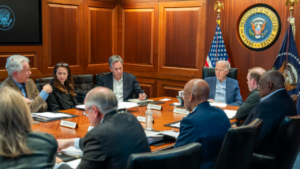Last updated on 10 April 2024
Discover the top 10 most notorious terrorist organizations shaping global security in 2024. From Al-Qaeda to ISIS, explore the latest threats and developments in this comprehensive list.
- Al-Qaeda: Founded by Osama bin Laden, Al-Qaeda gained global notoriety for the September 11 attacks in the United States. It operates worldwide and aims to establish a global Islamic caliphate.
- Islamic State (ISIS/ISIL): Also known as Daesh, ISIS emerged in Iraq and Syria, aiming to establish a caliphate based on its extreme interpretation of Sunni Islam. It gained attention for its brutal tactics and control over territory.
- Taliban: Originating in Afghanistan, the Taliban is an Islamist militant group known for its strict interpretation of Sharia law. It controlled most of Afghanistan until being overthrown by the US-led invasion in 2001 but continues to operate.
- Boko Haram: Based in Nigeria, Boko Haram seeks to establish an Islamic state governed by Sharia law. It gained international attention for its abduction of hundreds of schoolgirls in 2014.
- Hamas: Hamas is a Palestinian Islamist group that controls the Gaza Strip. It’s designated as a terrorist organization by several countries due to its militant activities, including rocket attacks against Israel.
- Hezbollah: Based in Lebanon, Hezbollah is a Shia Islamist group with significant political and military influence. It’s designated as a terrorist organization by several countries for its involvement in attacks against Israel and other actions.
- Al-Shabaab: Operating mainly in Somalia, Al-Shabaab is an Islamist militant group affiliated with Al-Qaeda. It seeks to overthrow the Somali government and establish Sharia law.
- Lashkar-e-Taiba (LeT): Founded in Pakistan, LeT aims to establish an Islamic state in South Asia. It’s responsible for numerous attacks in India, including the 2008 Mumbai attacks.
- Haqqani Network: Operating in Afghanistan and Pakistan, the Haqqani Network is known for its close ties to the Taliban and Al-Qaeda. It’s responsible for numerous attacks against Afghan and US forces.
- FARC (Revolutionary Armed Forces of Colombia): FARC was a Marxist-Leninist guerrilla group in Colombia that fought against the government for decades. It engaged in terrorist activities such as bombings, kidnappings, and drug trafficking. In recent years, it has transitioned into a political party following a peace agreement with the Colombian government.
Important to Note:
- The designation of terrorist organizations can vary between countries and organizations, and perceptions of terrorism can be influenced by political, cultural, and ideological factors.
- The landscape of terrorism is constantly evolving, with new groups emerging and existing groups adapting their tactics.
The Human Cost of Terrorism:
It is important to remember the devastating humanitarian impact of terrorist activities. These organizations cause immense suffering, civilian casualties, displace populations and disrupt life around the world.
The Common Thread
- Ideology: Many terrorists are motivated by extremist ideologies, often religious or political in nature. These ideologies justify violence to achieve their goals. Extremist groups often misuse religious texts and symbols to spread hatred and fear. They may distort phrases like “Allahu Akbar“, which have peaceful meanings for Muslims, to serve their violent agenda.
- Sense of injustice: Perceived grievances or a desire to right wrongs can be a motivating factor.
Methods, Motivations, and Mitigations
Methods: Terrorists adopt a variety of brutal methods, causing terrible suffering to innocent people. This includes bombings, assassinations, kidnappings, cyber attacks and the use of firearms, bladed weapons and even vehicles as weapons. They target civilians, government institutions, critical infrastructure and religious sites to spread fear and chaos. Counterterrorism efforts require constant vigilance and adaptation to evolving strategies.











Be First to Comment